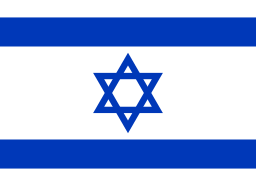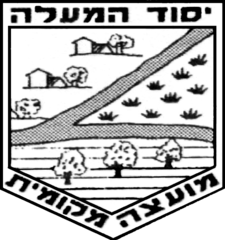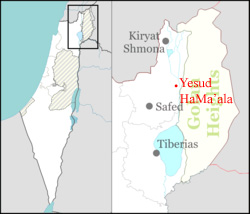
יסוד המעלה ישׂראל Coordinates: 33° 03' 22.22" N 35° 36' 14.66" E 
|
||

יסוד המעלה ישׂראל Coordinates: 33° 03' 22.22" N 35° 36' 14.66" E 
|
||
| Home | Maps | The Fallen | Links | Census |

Yesud HaMa'ala is a moshava founded in 1883 in the Hula Valley, in northern Israel. It is considered the fourth agricultural settlement established during the first Aliyah. Motivated by the Zionist Aliyah, the village name Yesud HaMa'ala is taken from the Bible (Ezra 7:9): "He [Ezra] determined to go up."
The land where the village was established was purchased by the Abu Family of Safed in 1871, who called their land "Mei Merom"; it was later changed to "Nahala, Sade V'kerem" — "Estate, Field, and Vineyard". The Arabs referred to this land as "A-Zbeid".

The first twenty-four Yesud HaMa'ala settlers were "Hovevei Zion" — "Lovers of Zion". These were Jews who emigrated from Tsarist Russia beginning in 1881 in reaction to the anti-Jewish pogroms instigated by the assassination of Tsar Alexander II. The Hovevei Zion are the founders of modern Zionism. Most of these first settlers in Yesud HaMa'ala came from Medzerich and Brisk, in the Russian Empire. Read thumbnail sketches, in Hebrew, of the first twenty-one settlers.
In the late nineteenth century the Hula Valley consisted primarily of swampland; there was also a shallow lake, fifteen-thousand acres in area (61 km2), appropriately named Lake Hula. The valley was a well-known breeding-ground for malarial mosquitoes. The threat of malaria restricted further Jewish settlement for fifty years. Only after drainage technology and development of pesticides improved sufficiently in the 1920s, was settlement feasible. In 1922, a Palestine-wide census taken by the British Mandate Authority recorded a population of 142 Jews living in Yesud HaMa'ala (see the census table on the Data Tab).
Dubrovin Farm (אחוזת דוברובין) was one of the first farms in the Hulah Valley. The farm was founded by Andrey Dubrovin (1863 - 1967) who, along with his family, moved to Ottoman, Syria in 1903. In 1909 the Dubrovin family bought the land that was to become the farm from Baron Rothschild. Currently, Yesud HaMa'ala is home to the farm, which is now a museum commemorating the founders of the community. A section of the museum includes the ruins of a synagogue dating from between the fourth and sixth centuries of the common era; the synagogue supports the historic Jewish claim to the region. (Wikipedia on Dubrovin Farm.)
|
Please contact Leah Haber Gedalia with your additions, questions, corrections, or comments! webmaster: richard L. baum |
|
This page is hosted at no cost to the public by JewishGen, Inc., a non-profit corporation. If it has been useful to you, or if you are moved by the effort to preserve the memory of our lost communities, your JewishGen-erosity would be deeply appreciated. |
|
KehilaLinks Home |
JewishGen Home
|
Created: 14 May 2017
Last Modified: 05-21-2018
Copyright © 2017 Leah Gedalia
All Rights Reserved.